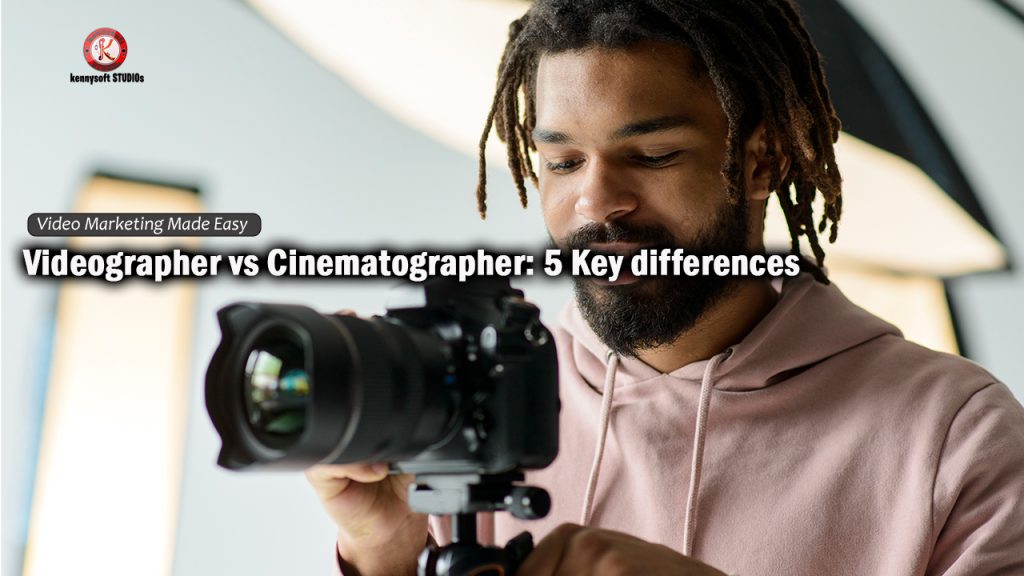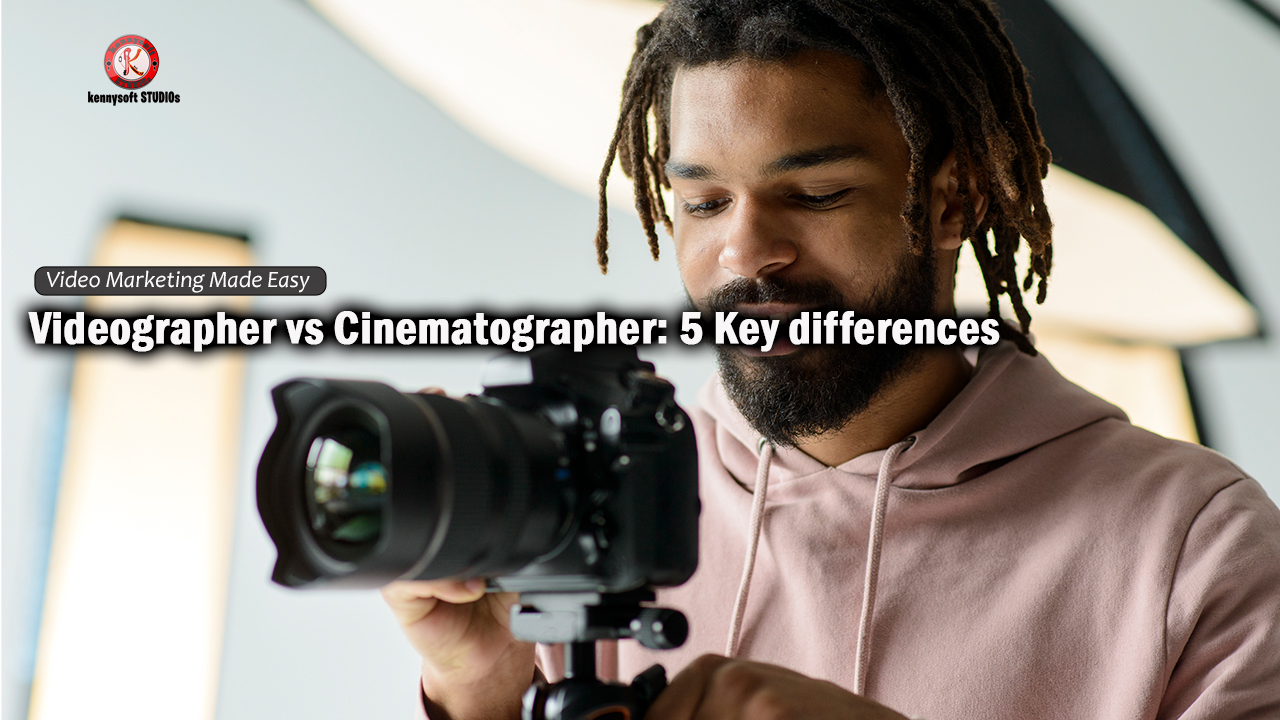
- Videographer vs Cinematographer: understanding the difference
- Understanding the roles and responsibilities of a videographer
- Exploring the art of cinematography
- Key differences between a videographer and a cinematographer
- When to hire a videographer or a cinematographer
- Factors to consider when choosing between a videographer and a cinematographer
- Real-life examples of videography and cinematography projects
- Tips for working with a videographer or a cinematographer
- The future of videography and cinematography
- Conclusion: Which one is right for you – videographer or cinematographer?
Videographer vs Cinematographer: understanding the difference
When it comes to capturing motion pictures, two terms that often come up are “videographer” and “cinematographer.” While the two may sound similar, they actually refer to different roles in the world of video production. In this article, we will delve into the distinction between a videographer and a cinematographer, exploring their roles, responsibilities, and the key differences that set them apart. By the end, you’ll have a clearer understanding of which one is right for your project.
Understanding the roles and responsibilities of a videographer
A videographer is typically responsible for capturing live events, such as weddings, conferences, or interviews. They focus on documenting the event as it happens, ensuring that every important moment is captured on camera. Videographers often work with a single camera and are skilled in capturing footage that tells a story. They excel at capturing candid moments, emotions, and the overall atmosphere of an event.
In addition to shooting the video, videographers may also handle the editing process, ensuring that the final product is polished and ready for distribution. They are proficient in using video editing software and possess the technical skills necessary to enhance the footage they have captured. A videographer’s main goal is to provide a comprehensive and engaging visual representation of an event.

Exploring the art of cinematography
Cinematography, on the other hand, is an art form that involves crafting the visual aesthetic of a film or video. A cinematographer, also known as a director of photography, works closely with the director to create the desired look and feel of a production. They are responsible for making artistic and technical decisions related to lighting, camera angles, composition, and movement.
Cinematographers often work on scripted films, documentaries, or commercials, where they have more creative control over the visual storytelling. They work with a team of professionals, including lighting technicians and camera operators, to achieve their vision. Cinematographers are skilled in manipulating light and using various camera techniques to create a visually stunning and impactful result.
Key differences between a videographer and a cinematographer
While both a videographer and a cinematographer work with moving images, there are key differences in their roles and responsibilities. A videographer focuses on capturing events as they happen, often working alone or with a small team. Their main objective is to document the event and ensure that all important moments are recorded. A videographer is more concerned with capturing the reality of the moment rather than creating a visually artistic product.
On the other hand, a cinematographer is responsible for creating a visually stunning and impactful result. They work closely with the director to craft the visual aesthetic of a production, making artistic and technical decisions that enhance the storytelling. Cinematographers have a higher level of creative control and often work with a larger team to achieve their vision.
When to hire a videographer or a cinematographer
The decision to hire a videographer or a cinematographer depends on the nature of your project and the desired outcome. If you are looking to capture a live event or document a special occasion, a videographer may be the right choice. They excel at capturing candid moments and providing a comprehensive visual representation of an event.
On the other hand, if you are working on a scripted film, a documentary, or a commercial where the visual aesthetic is crucial, a cinematographer is the way to go. They have the artistic and technical skills to create visually stunning and impactful imagery that enhances the storytelling.

Factors to consider when choosing between a videographer and a cinematographer
When choosing between a videographer and a cinematographer, there are several factors to consider. First and foremost, consider the nature of your project and the desired outcome. If you are looking for a more documentary-style approach, a videographer may be the better choice. However, if you want a visually stunning and artistic result, a cinematographer is the way to go.
Budget is another important factor to consider. Cinematographers typically command higher rates due to their specialized skills and the larger team they work with. Videographers, on the other hand, may offer more affordable options, especially for smaller projects or events.
Lastly, consider the portfolio and previous work of potential videographers or cinematographers. Look for examples that align with your project’s vision and style. Pay attention to the quality of their work, their ability to capture emotions, and their technical skills.
Real-life examples of videography and cinematography projects
To better understand the distinction between videography and cinematography, let’s explore some real-life examples. Imagine you are planning a wedding and want to capture the special moments of the day. In this case, hiring a videographer would be ideal. They will ensure that every emotional moment, from the exchange of vows to the first dance, is captured on video.
Now, imagine you are working on a short film with a compelling storyline and a visually striking visual aesthetic. Hiring a cinematographer would be the right choice in this scenario. They will work closely with the director to create stunning visuals that enhance the storytelling and captivate the audience.
Tips for working with a videographer or a cinematographer
Regardless of whether you choose to work with a videographer or a cinematographer, there are some tips that can help you make the most of your collaboration. First, clearly communicate your vision and expectations for the project. Provide examples, references, or mood boards to ensure that everyone is on the same page.
Second, establish good communication from the start. Regularly check in with your videographer or cinematographer to discuss progress, address any concerns, and provide feedback. Open and honest communication will foster a better working relationship and lead to a successful outcome.
Lastly, trust the expertise of your videographer or cinematographer. They are professionals in their field and have the knowledge and experience to bring your vision to life. Be open to their suggestions and ideas, as they may have insights that can take your project to the next level.
The future of videography and cinematography
As technology continues to advance, the world of videography and cinematography is evolving. New tools, techniques, and equipment are constantly being developed, allowing for even more creative possibilities. The line between a videographer and a cinematographer may become blurred as professionals incorporate elements of both roles into their work.
Virtual reality and augmented reality are also emerging trends that will likely impact the field of videography and cinematography. These technologies offer immersive and interactive experiences, opening up new avenues for storytelling.
Conclusion: Which one is right for you – videographer or cinematographer?
In conclusion, the distinction between a videographer and a cinematographer lies in their roles, responsibilities, and the desired outcome of a project. A videographer focuses on capturing live events and providing a comprehensive visual representation, while a cinematographer crafts visually stunning and impactful imagery that enhances the storytelling.
When deciding which one is right for your project, consider the nature of your project, the desired outcome, and your budget. Look at examples of their previous work and choose a professional whose style aligns with your vision. Regardless of whether you choose a videographer or a cinematographer, effective communication and trust will contribute to a successful collaboration.






